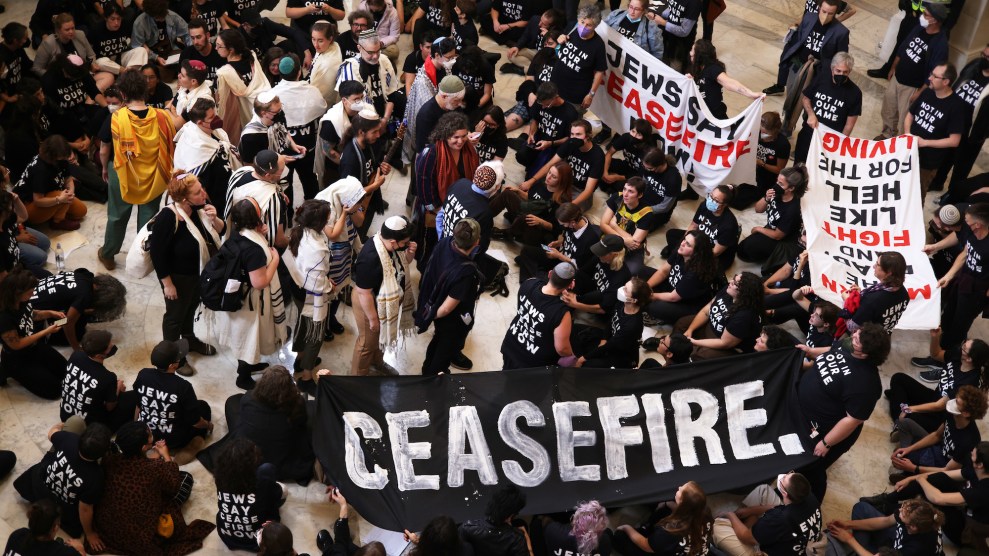
Protesters stage a demonstration in support of a ceasefire in the Cannon House Office Building last month in Washington, DC.Alex Wong/Getty
Since October 7, there has been a divide. Polls have found that Democratic voters are about equally sympathetic to Palestinians and Israelis, do not approve of Israel’s response to the attack by Hamas, and favor sending humanitarian aid to Gaza by far larger margins than sending weapons to Israel. But these have not been the priorities of the representatives they elected.
President Joe Biden and most Democrats in Congress continue to take the pro-Israel line that the party has for decades. Biden has rejected calls for a ceasefire while adhering to a longstanding personal policy of largely refraining from public criticism of Israel. Most Democratic members of Congress have avoided breaking with the administration or making themselves a target for pro-Israel groups. Like the president, they tend to be old—the average Democratic House member is 58 and the average senator is 65—and came of age at a time when largely unconditional support for Israel was the norm.
Their positions are particularly at odds with the younger voters whom Democrats will need to win next year. Many young progressives appear more disgusted with a Democratic president than they have been in decades. At the anti-war protests that have spread across the nation, they have chanted, “Biden, Biden, you can’t hide; we charge you with genocide.” The concern for Democrats is not so much that younger voters will back Republicans in 2024, but that they will support a third-party candidate, or not vote at all.
There is limited survey data on support for a ceasefire. A poll from the left-leaning Data for Progress last month showed that two-thirds of all voters, including 80 percent of Democrats, support the United States calling for a ceasefire. So far, a pro-ceasefire resolution introduced by Rep. Cori Bush (D-Ill.) is backed by only 18 of 212 House Democrats. Along with them, perhaps a couple dozen additional Democrats have called for some form of stopping the violence.
Waleed Shahid, a Democratic strategist and former communications director for Justice Democrats, said that he believes most Democrats have not called for a ceasefire because of the “political wrath they would face” from groups like the American Israel Public Affairs Committee and Democratic Majority for Israel. AIPAC alone spent at least $28.5 million in the last election cycle, according to Jewish Currents. Much of that went to defeating progressive candidates seen as critical of Israel.
In Michigan, AIPAC spent more than $4 million in a Democratic primary to defeat Andy Levin, a Jewish member of Congress who had said “there is no way to have a secure, democratic homeland for the Jewish people unless we achieve the political and human rights of the Palestinian people.” Levin had served as the president of his synagogue prior to being elected. AIPAC successfully backed Rep. Haley Stevens, who is not Jewish but had pledged “unequivocal support” for Israel. There is no similarly powerful pro-Palestinian group that supports those who call out what many human rights groups now consider to be an Israeli apartheid state.
Along with Stevens, AIPAC announced early endorsements of dozens of Republicans who voted against certifying the results of the 2020 election in what many interpreted as a sign that the group values protecting Israel more than democracy in America. Rep. Mark Pocan (D-Wis.) has been unusually candid about his view of the group. “I don’t give a fuck about AIPAC—period,” Pocan said in a recent interview with Slate. “I think they’re a cancerous presence on our democracy and politics in general, and if I can be a surgeon, that’s great.”
Pocan told me this week that he considers AIPAC an “extension of the conservative movement” and a threat to democracy. “I’ve always said that if [an election] just goes to whoever spends the most money, that’s called an auction,” he explained. “I feel like they’ve tried to make them auctions. I think that’s bad for democracy. I think it’s an awful approach. And I think they’re getting ready to do that again.”
Beth Miller, the political director at Jewish Voice for Peace Action, said another factor limiting support for a ceasefire among Democrats is that legislators do not want to break with Biden, who has supported a temporary pause in the fighting but said on Thursday about the chances for a ceasfire: “None, no possibility.” She sees the push for a humanitarian pause as “absurd.”
“Are they saying that we just pause the bombs, bring in some nourishment, some food, and humanitarian aid? And then, great, let the bombs drop again?” Miller asked. “There is one clear way forward, and it needs to be a full-on negotiated ceasefire.”
Pocan said he’s seen about 30 to 40 members call for a halt to the war. He argued that it was an error to initially focus primarily on a ceasefire resolution, given that one has no chance of passing in a body controlled by House speaker Mike Johnson. He is working with Reps. Betty McCollum (D-Minn.) and Alexandria Ocasio-Cortez (D-N.Y.), along with groups like Jewish Voice for Peace, to gather support among colleagues for a letter to Biden and Secretary of State Antony Blinken that backs a cessation of hostilities.
Congressional Democrats are expected to overwhelmingly vote in favor of sending Israel the $14 billion of mostly military aid requested by the Biden administration—with no strings attached. The administration is asking for significantly less humanitarian aid for Palestinians: a total of $9 billion that would be split in still-unspecified amounts among Israel, Palestine, and Ukraine.
A November 2 poll from Quinnipiac University found that Democrats support sending military aid by a 6-point margin. The relatively thin support among Democrats is striking considering that Biden and nearly all Democrats in Congress favor sending that aid. An Associated Press poll released Wednesday found that 47 percent of Democrats believe the United States is spending too much much supporting Israel, compared to 41 percent who believe it is spending the right amount and 8 percent who think it has provided too little.
Support for military aid is highly concentrated among older voters. The Quinnipiac poll found that 65 percent of all voters between the ages of 18 to 34—not just Democrats—oppose sending military aid to Israel, compared to 29 percent who support doing so. Those numbers are inverted among voters 65 and older, who favor sending weapons by a 46-point margin. The AP poll found that 65 percent of Democrats under 45 and 58 percent of nonwhite Democrats disapprove of Biden’s handling of of war, while 67 percent of those 45 and older and 62 percent of white Democrats approve of it.
The main issue that enjoys overwhelming support among Democratic voteres is sending humanitarian aid to Gaza and Israel. Thirty-nine percent of Democrats said in the AP poll the United States has not provided enough humanitarian aid to Gaza, compared to 19 percent who think it has provided too much. But aid for Palestinians is not what Democratic politicians have prioritized in their messaging and policy proposals: The Biden administration initially called for sending just $100 million to Palestinians.
Interviews with Democratic aides in Congress, who requested anonymity to speak freely, pointed to a similar generation gap on the Hill, where junior staffers are less likely to be as staunchly pro-Israel as senior staffers and members of Congress. A young Muslim staffer described the disgust of watching someone like Brian Mast, a Florida Republican, compare Palestinian civilians to Nazis on the House floor. The staffer contrasted the speed at which Democrats condemned Russian war crimes and the deaths of Ukrainian civilians with what members have been willing to say about Israeli airstrikes that have killed thousands of women and children in Gaza.
Mast: I think when we look at this, as a whole, I would encourage the other side to not so lightly throw around the idea of innocent Palestinian civilians. I don't think we would so lightly throw around the term innocent Nazi civilians pic.twitter.com/OqDpJHZiHV
— Acyn (@Acyn) November 1, 2023
A Democratic aide who works for a representative who does not support a ceasefire said their office has been receiving thousands of calls in support of a ceasefire and hardly any calls against one. In these calls, many constituents have said they will not vote for members who do not back a ceasefire. Despite that, the aide said senior staff have been dismissive about the attitudes of pro-ceasefire constituents and the potential electoral costs of ignoring their concerns.
The aide talked about the pain of listening to constituents tell them they have blood on their hands. They want to say they agree, but know they have to stick to pre-approved, pro-Israel talking points. Having gone into politics to try to enact their values, they now find themselves working for a member of Congress they believe is tolerating war crimes. The Instagram account Dear White Staffers, which has more than 100,000 followers, is filled with similar, albeit unverified, reports from anonymous staffers.
When it comes to rhetoric, Democratic representatives and administration officials have, with notable exceptions, generally failed to express anywhere near the level of sympathy for the more than 10,000 Palestinians killed since October 7—more than 4,100 of them children, according to the Gaza Health Ministry—as they have for the roughly 1,400 Israelis killed in the Hamas massacre. When Democrats do express concern for Palestinians, it often comes in pro forma calls for Israel to obey the laws of war without any reference to the potential consequences of failing to do so.
A Palestinian American couple told the Washington Post about a meeting with an unnamed Democratic senator who appeared sympathetic but afraid to lend support publicly. The senator declined to back humanitarian corridors and reportedly hesitated when the couple pushed for drinking water for people in Gaza. “Senator, we’re asking for water,” the husband asked. “You can’t ask for water?’”
In recent days, the Biden administration has made some limited efforts to publicly distance itself from Israel. A senior administration official told NBC News last week that part of the motivation for doing so was that if “this really goes bad, we want to be able to point to our past statements.”
Shibley Telhami, the Anwar Sadat Professor of Peace and Development at the University of Maryland, said last week that Biden could take a tougher line with Israel, and warned of the potential consequences of him choosing not to. “I don’t think what the president is doing is the automatic political thing,” he said. “And in the end, I actually think that it’s probably going to cost him the election.”
On Wednesday, the University of Maryland released the second of two polls that Telhami, an expert on public opinion in the United States and the Arab world, has overseen since October 7. In an accompanying analysis, Telhami explained that Israel has now lost much of the support it gained from the initial attack, particularly among Democrats.
The new poll found that 41 percent of Democrats under 35 believe the Biden administration is too pro-Israel, compared to just 20 percent who felt that way two weeks earlier. Only 2 percent of young Democrats think Biden is too pro-Palestinian. The share of young Democrats who said they were less likely to vote for Biden as a result of Israel and Palestine jumped from 9 percent to 21 percent.
Shahid agreed with Telhami that Biden’s response to the war could come back to haunt him. “It absolutely could cost Biden the election in 2024, which would be a horrendous outcome,” he said. “I don’t see Democratic strategists or Democratic leaders taking that as seriously as it should be.”
Shahid added there is a complacency among the Democratic establishment that assumes voters will return to Biden once Trump is on the ballot. “That was the theory in 2016,” he said. “And it just didn’t work.”
















